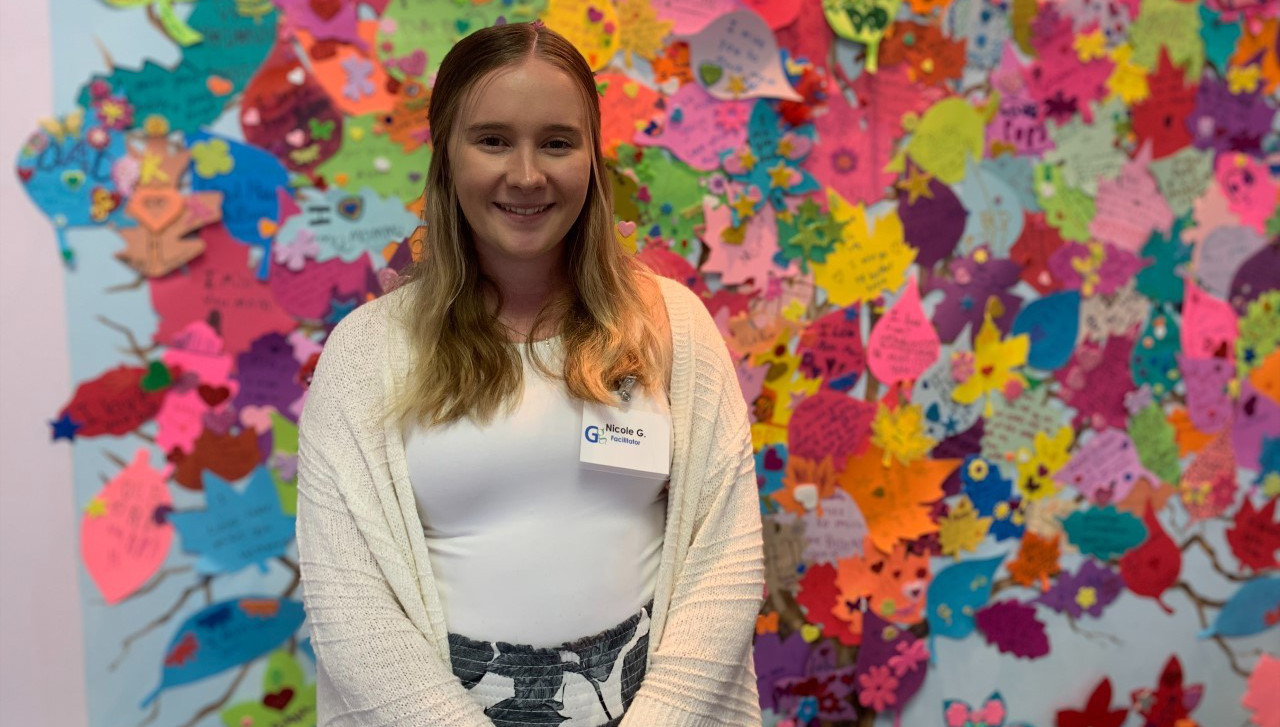Summer Spotlight: Nicole Gomber '23

Nicole Gomber '23 is a summer intern at Good Grief, a grief support center for children and families in Morristown, NJ. She is a part of the University's Royal Experience Internship Program.
Here, she answers questions about her experience.
Describe a typical day on the job.
On a typical day in June, I come into work at 2:00 pm to help set up for Nights of Support, which are support groups for children and adults who experienced the death of an immediate family member. These groups meet Tuesdays, Wednesdays, and Thursdays during the school year from 7 pm - 8:30 pm.
When I get to work, I go to all of the rooms and set up lighting, take out the trash, restock group activities and water bottles, turn on air purifiers, and make sure every room is clean before the groups meet. After setting up the rooms, I fill up the coffee makers and tea kettles in case families want coffee or tea.
After that, I work on our company’s “Community Outreach Database,” which compiles a list of faith-based and community-based organizations, medical providers, and funeral homes to give out as resources for the families.
Along with being a summer intern on Nights of Support, I also take on the role of a group facilitator. In that role, I co-lead support groups in conversation to encourage peer support and lift up one another. I help explain activities and what the meaning behind each activity is. I also take attendance of group participants and facilitators for every Night of Support and log that information into the computer. When the Night of Support is over, the facilitators shortly debrief, and I leave around 9:00 pm.
I come in on Mondays and Wednesdays in the months of July and August. Mostly, I log in necessary information to help with the next program year. I make attendance sheets for families deciding to participate next year, facilitator notes from last year, and gather all feedback from volunteers to help improve activities or groups in September. I also help with preparation for the Good Grief summer camp in August.
What is the duration of your job?
I will be with Good Grief from June 8 to August 5 as an intern. However, I would love to come back in the future as a volunteer!
What are some of the skills you have learned?
Aside from the obvious skills I’ve learned, (i.e., using excel, data collection, etc.), one of the most important skills I’ve learned is language. Society looks at death as a very taboo topic that nobody wants to discuss in a serious manner. However, people use terms to lessen the seriousness of death, or make it a joke.
For example, expressions like, “I died of laughter” or “I’m dying for an ice cream” are expressions I have to be careful about using in front of the children. They could be uncomfortable or hurt by the unnecessary use of death in silly conversations.
On top of that, some children experience the death of a parent or sibling so young, to the point where they don’t understand what death even means. When talking to the youngest support group containing children between ages three and five, we refrain from using words like “lost” “passed” or “at peace” as opposed to “died” or “dead” because this phrasing can confuse the child even more about what death is. This internship has helped me recognize my vocabulary and to be careful with my words, especially in front of families.
Another skill I have learned is to let the children be in control of the support group instead of me, as the facilitator. Unlike many support groups, Good Grief stresses that you do not have to talk about the death of your loved one if you don't want to. While it is better for children and young adults to open up about their grief, their comfort takes priority, and we would rather have Good Grief remain a safe environment than a stressful one.
Many children use the support group as a place to talk about what they are going through where other people understand. To others, Good Grief is ironically a place to escape from talking about it and just chit chat with friends. Forcing children to talk about their trauma when they aren't ready or comfortable only turns them away from help more.
What do you enjoy most about your job?
What I enjoy most about my job is getting to put a smile on the faces of children who have experienced such a traumatic event. While most of my job is behind-the-scenes administration work, the few times I have been able to facilitate groups have been the most rewarding experiences of my career thus far!
What were your expectations of the job? Does it match the reality?
My expectations for the job was that my role would be 100% administrative and that I wouldn’t be interacting much with families. I was pleasantly surprised to find out that my role was partially administrative and hands on with families. I also expected to learn about what it is like to work for a non-profit organization. This matched and exceeded my expectations in that I learned about community outreach in the Morristown and Princeton areas in New Jersey.
How do you feel this job has prepared you for the real world?
This job has definitely prepared me for the real world because I am learning the proper way to comfort a grieving family and, specifically, how to comfort different age groups. How small children like to be comforted is extremely different compared to how adolescents and young adults want to be comforted. This also has prepared me professionally. I am considering working for a non-profit organization in the future so it is very important to be to gain experience interning for one and seeing if it is something I would enjoy doing.






